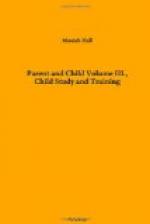In common with every organism the infant develops from a single germ cell of almost microscopic size. Wrapped in this tiny cell are all the possibilities of structure and character that combine to form the complicated bodily organism and the particular mental endowment of the coming child.
It was once believed that almost any kind of physical or mental change could be brought about in the cell through appropriate control of the environment, but the results of careful observation and experiment are opposed to this view; all evidence points to the fact that no new character or element can enter the embryo from without. The cell itself holds the secret of what the future individual shall be.
The sole connection between the embryo and the mother is the narrow, umbilical cord which contains no nerves and whose only function is to carry blood to the growing organism; it may be seen, therefore, how impossible it is for mental impressions and disturbances on the part of the mother to in any way reach and affect the embryo. Once started on the road to development, the embryo is so thoroughly subject to inner laws that nothing from without can modify or change the direction of its growth except some physical cause which interferes with the blood supply. An adequate supply of pure blood is the principal requirement of the growing organism. Whatever interferes with the blood supply or in any way affects its purity, has an injurious affect upon the embryo. There is not the least doubt that lack of nutrition and serious ill-health on the part of the mother have an extremely bad effect upon the unborn offspring. Severe shock or grief, worry, nervous exhaustion, disease, and poisons in the blood of the mother are the most serious sources of injury; they render nutrition defective and if poison enters directly the blood of the mother or is generated by toxins through disease, the embryo will be poisoned and may be destroyed. Among these poisons are alcohol, lead, and the toxins from tuberculosis and the venereal diseases, gonorrhea and syphilis. To gonorrhea is attributed 80 per cent. of the blindness of children born blind; it is declared to be the cause of 75 per cent. of all the surgical operations for female disorders and of 45 per cent. of involuntary sterility in childless women. Syphilis is the chief cause of feeble-mindedness, paresis, or softening of the brain, and of most other mental defects in children.
From the foregoing, it is evident that the proper care of the mother so as to insure a pure blood supply for the offspring ought to be one of the chief concerns of society. This should not be left to the haphazard efforts of individuals but ought to be provided for by the state. According to the statements of life insurance companies, “expectant mothers are the most neglected members of our population.” Dr. Van Ingen, of New York City, estimates that 90 per cent, of women in this country are wholly without prenatal care.




